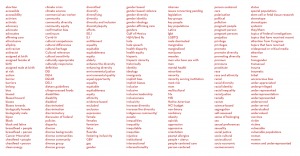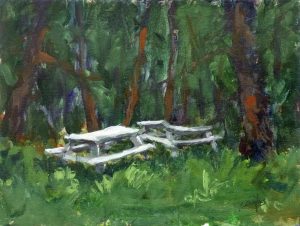 The Columbia City Yoga on-line Moving into Meditation class met this morning. In today’s class we explored the vital importance of how we find meaning: our stories and our attention. We gather around the “kitchen table” of our practice to share stories and also practicing present moment awareness. Words are fundamental to the stories we share. Present moment awareness is fundamental to our felt sense of being. Our miraculous consciousness enables us to communicate and promote flourishing for all in our web of being.
The Columbia City Yoga on-line Moving into Meditation class met this morning. In today’s class we explored the vital importance of how we find meaning: our stories and our attention. We gather around the “kitchen table” of our practice to share stories and also practicing present moment awareness. Words are fundamental to the stories we share. Present moment awareness is fundamental to our felt sense of being. Our miraculous consciousness enables us to communicate and promote flourishing for all in our web of being.
We heard poet Deena Metzger’s alert to the 250 banned words the administration is disappearing. You can read Deena’s moving newsletter at her April 8th Substack post. She added the following encouragement to begin reading banned books:
Here is the beautiful contradiction: PEN America found 10,046 instances of individual books banned, affecting 4,231 unique titles. We could spend a lifetime reading all of them. Similarly, the 381 books just removed from the library of the Naval Academy, include as I browsed them, books about Ernest Hemingway, T.S. Eliot, James Joyce, Marcel Proust, William Faulkner, Richard Wright, Anais Nin, and I Know Why the Caged Bird Sings, by Maya Angelou. We now have a reading list of a minimum of 10,046 + 381 books. The banned words create a field of awareness and intelligence that guide us in ethical behavior and toward developing a future for all beings. Many of those whom the administration want to ban may well be soul companions in these difficult times.
We drew from PEN America’s list of 250 banned words the administration is scrubbing from government web-sites.
We heard neurologist philosopher Sam Harris’ Big Think interview, Breaking the Spell of Propaganda. Sam spoke to the two ways we humans find meaning: our stories and our attention.
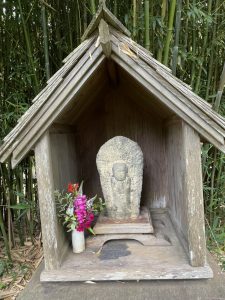 We heard Joy Harjo’s poem Perhaps the World Ends Here. The poem is about the kitchen table a place where we as family and friends gather to celebrate our joys and mourn our sorrows.
We heard Joy Harjo’s poem Perhaps the World Ends Here. The poem is about the kitchen table a place where we as family and friends gather to celebrate our joys and mourn our sorrows.
We heard some of poet Jane Hirshfield’s comments on compassion. These words were drawn from her 2015 Tricycle Magazine interview: Felt in Its Fullness.
Guided Reflection
Welcome. In last week’s class we explored the ways our inter-being can help us to respond to the world. Dancing joyfully under the cherry trees and demonstrating our truth on city streets are expressions of deep caring and aliveness. They are both ways of bringing our practice alive in the world.
I continue to seek balance between responding to life’s difficulties and nourishing and uplifting the heart. I aspire to let the world in without getting overwhelmed. Every day brings a new loss. This week I read PEN America’s list of 250 banned words the current administration is attempting to disappear from our language.
Poet Deena Metzger believes
. . . we should say the words and write them as often as possible, to see how to honor them and what they truly indicate, to find ways to support and sustain what the administration is refusing. The more I said the words the more power they gathered to them. The words create a world.
Words being prohibited; people being silenced. . . . Clearly, what is denied is what is truly important. The words interact with each other to create a vibrant field of consciousness as happens also when people formerly unaware of each other gather in community, when a crowd transforms into a congregation.
Words are so fundamental. Language enables us to understand the world. They make cooperation and coordination possible. They enable us to express and safeguard all that we care about. They form the basis of civilization.
 Neurologist and writer Sam Harris believes we find meaning in two ways. He describes:
Neurologist and writer Sam Harris believes we find meaning in two ways. He describes:
. . . the more superficial level . . . is the level of the stories we tell ourselves about our lives, the kinds of thoughts we think, the things we believe, the narratives we trade in, and the conceptual frame around which we view, experience. . . . people are persuaded . . . by stories in the end. And they’re incredibly motivating. But they’re not the most fundamental layer of our experience.
What’s more basic than stories is our attention in each moment. Just what we can locate in our experience directly. . . . how satisfying it is to see the universe through our own eyes. . . ? . . . can you let your attention fully sink into the present moment so that you can discover what is beautiful there, what is sacred there, what is self-transcending there, what is a source of profound well-being and fulfillment? . . . can you arrive in the present moment in such a way that its depth reveals itself to you, to consciousness in the present?
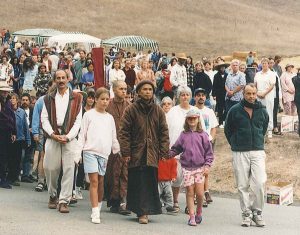 We are sharing stories and also practicing present moment awareness. Words are fundamental to the stories we share. Present moment awareness is fundamental to our felt sense of being. Our challenge is to discern the source of profound well-being and fulfillment. How do we create a world of meaning and mutual flourishing? We might need some of the banned words like:
We are sharing stories and also practicing present moment awareness. Words are fundamental to the stories we share. Present moment awareness is fundamental to our felt sense of being. Our challenge is to discern the source of profound well-being and fulfillment. How do we create a world of meaning and mutual flourishing? We might need some of the banned words like:
attention, care, equality, man, woman, people, mental health, sense of belonging, social justice
We might need some of the words in Joy Harjo’s poem, Perhaps the World Ends Here:
The world begins at a kitchen table. No matter what, we must eat to live.
The gifts of earth are brought and prepared, set on the table. So it has been since creation, and it will go on.
We chase chickens or dogs away from it. Babies teethe at the corners. They scrape their knees under it.
It is here that children are given instructions on what it means to be human. We make men at it, we make women.
At this table we gossip, recall enemies and the ghosts of lovers.
Our dreams drink coffee with us as they put their arms around our children. They laugh with us at our poor falling-down selves and as we put ourselves back together once again at the table.
This table has been a house in the rain, an umbrella in the sun.
Wars have begun and ended at this table. It is a place to hide in the shadow of terror. A place to celebrate the terrible victory.
We have given birth on this table, and have prepared our parents for burial here.
At this table we sing with joy, with sorrow. We pray of suffering and remorse. We give thanks.
Perhaps the world will end at the kitchen table, while we are laughing and crying, eating of the last sweet bite.
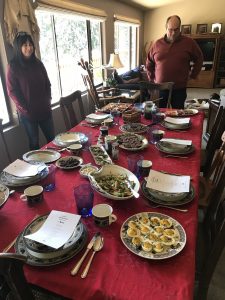 The kitchen table: an intimate place of gathering. When we pause, we can begin to experience ourselves as part of a vast web of life in which we eat and sleep, we dream, we birth and raise our children. “. . . we sing with joy, with sorrow. We pray of suffering and remorse. We give thanks.” Right now we can give thanks. Thanks for each other. Thanks for the sense of being part of it all. The ups and downs, the mysteries of being alive. What can we open to? How is it to meet what ever arises – even difficulties – with acceptance, kindness, curiosity? These are essential qualities of mindfulness.
The kitchen table: an intimate place of gathering. When we pause, we can begin to experience ourselves as part of a vast web of life in which we eat and sleep, we dream, we birth and raise our children. “. . . we sing with joy, with sorrow. We pray of suffering and remorse. We give thanks.” Right now we can give thanks. Thanks for each other. Thanks for the sense of being part of it all. The ups and downs, the mysteries of being alive. What can we open to? How is it to meet what ever arises – even difficulties – with acceptance, kindness, curiosity? These are essential qualities of mindfulness.
The stress and uncertainty of our daily lives give us plenty to worry about. Our practice can help to remind us of the goodness that’s already here and available in this moment. When we uplift the heart just a little we have more energy and strength to devote to the things we care about. I invite you to pause for a moment to gather your intention.
When you are ready, I invite you to turn your attention to the felt sense of being. Sense Body breathing. You might notice things change. The breath changes and you change. Nothing stays the same and there is constancy.
Let yourself receive each breath as a gift freely given. Feel how Body breathes in. Body fills with nourishing energy. See what it’s like to appreciate breathing in this way receiving each in-breath as a gift. Feel how Body breathes out. Body empties nourishing energy. How is it to appreciate giving each out-breath to Earth’s green beings?
Let yourself be nourished. Effortlessly let in and slowly let go. Open to the sacred peace of the moment. Notice Earth’s surface. Feel ground of being. Open to Being. Feeling Being. Physical sensations arise. You can meet them with attention. Breathe with them. Breathe with care and compassion. Meet sensitive areas with loving awareness. Invite any tension to relax. Breathe with sensation. Soften and notice how it changes. Calmly enter sensation with breath. Observe what arises, with kindness. Feeling being just as it is. Letting each moment be a new one. Enter each one afresh.
 Being here, right now, present for what is true. Present for those parts of our being that often go unheard, unseen. How do they feel? What do they express? How do they move you?
Being here, right now, present for what is true. Present for those parts of our being that often go unheard, unseen. How do they feel? What do they express? How do they move you?
Right now we can reflect on how we relate to ourselves. What words are shaping our relating? How do feelings speak? What are they saying? Inner and outer dialog shape experience. Right now we can reflect on what we are telling ourselves. What are we telling the world?
Meet whatever arises with compassion. Let it be in loving awareness. Giving it the attention and time it needs. Let it be a discovery you meet for the first time. Can you meet it kindly? To feel is human. To hunger is human. To need is human. What might you need in way of words, stories, memories and dreams? How many are intricately woven with others – with human and more than human lives?
 Let the world in. Reflect on the ordinary – kitchen table – kindnesses you’ve lived. You might think of something kind that someone said or did recently. It could be as simple as a smile or someone who spent time with you or offered to help you. Let that moment or person come to mind. Let your attention linger there for a bit. Notice any feelings or sensations of ease or pleasure however small. Feel and savor them.
Let the world in. Reflect on the ordinary – kitchen table – kindnesses you’ve lived. You might think of something kind that someone said or did recently. It could be as simple as a smile or someone who spent time with you or offered to help you. Let that moment or person come to mind. Let your attention linger there for a bit. Notice any feelings or sensations of ease or pleasure however small. Feel and savor them.
You might recall a moment of beauty, a moment of happiness or pleasure from the last few days or week. Let that moment come to mind . Is there any place in your body that feels good as you think of it? Maybe you feel it in your face or in your chest or somewhere else. Feel. Linger. Know this goodness.
Poet Jane Hirshfield remind us that living is an art. We can feel grateful in recognizing how little of our art-making is your own doing. She asks us to “think of how many things join in making a pear or apple—the tree, yes, but also the sun, rain, winter chill, the hours of darkness as much as the hours of light.” And we can savor it all.
She writes:
 Compassion, passion, and empathy share one root, in life as in language—each requires that we feel. For compassion to come into being, we need to enter fully into human life. . . .
Compassion, passion, and empathy share one root, in life as in language—each requires that we feel. For compassion to come into being, we need to enter fully into human life. . . .
Mindfulness – a loving awareness – helps us let the world in without getting overwhelmed. Let us be present, present to laugh and cry and eat of the last sweet bite at the kitchen table of life.

